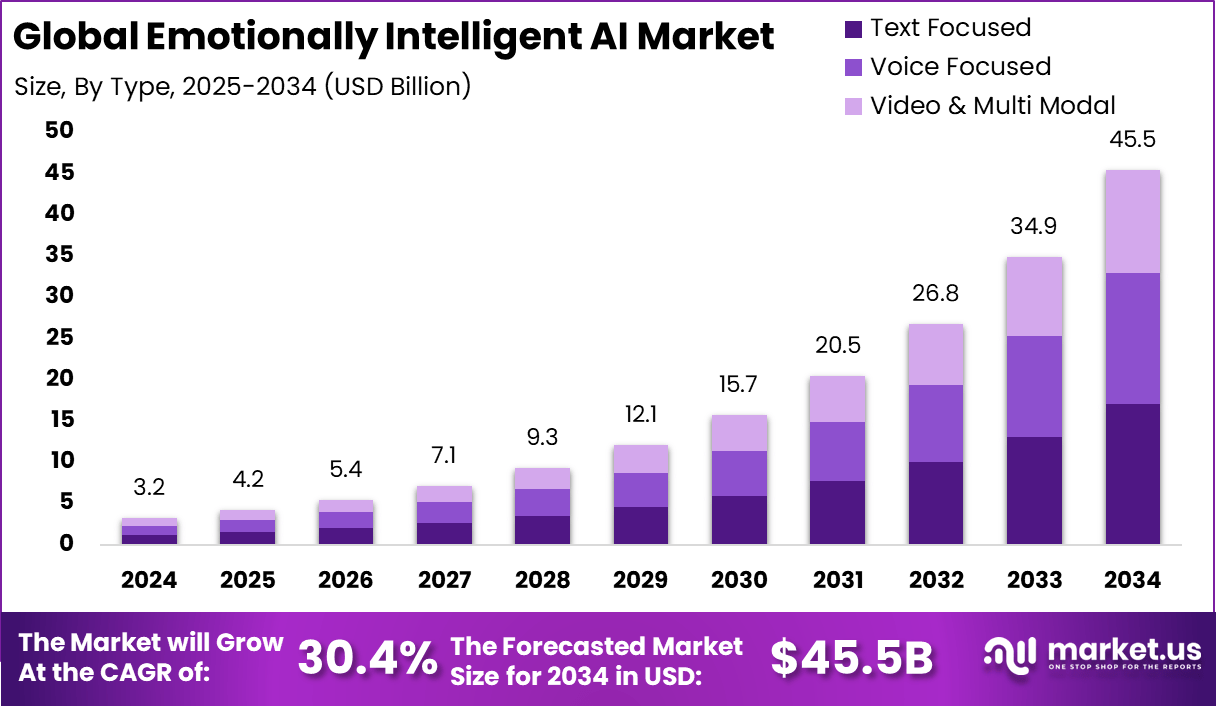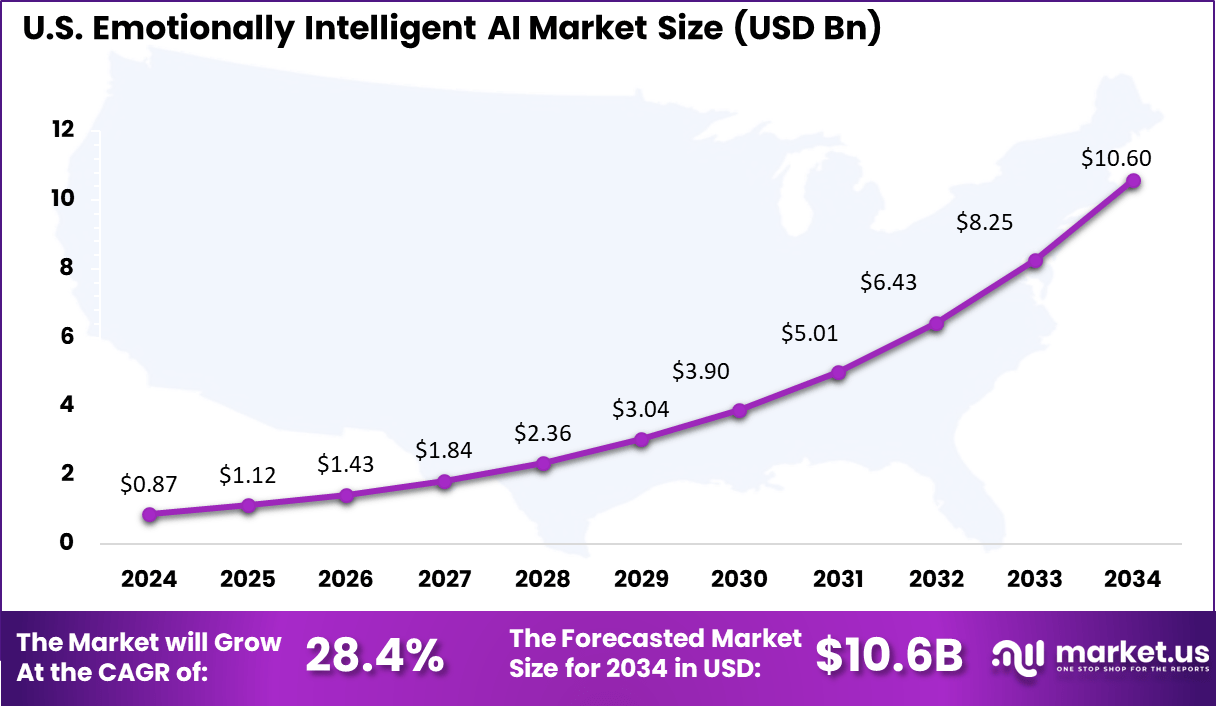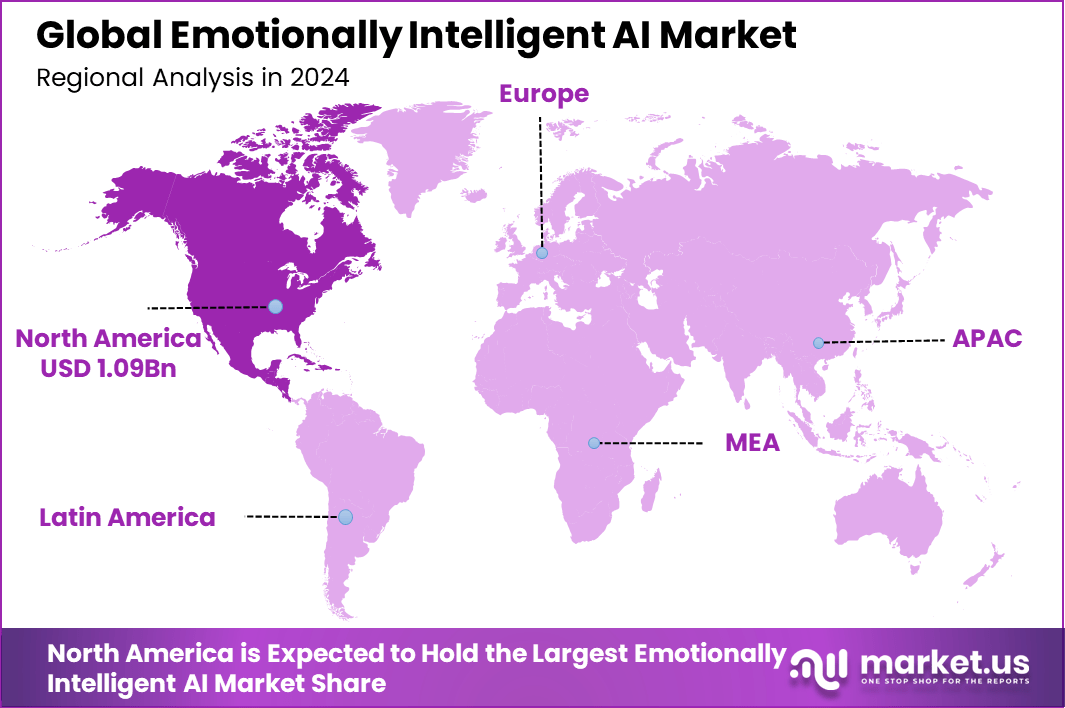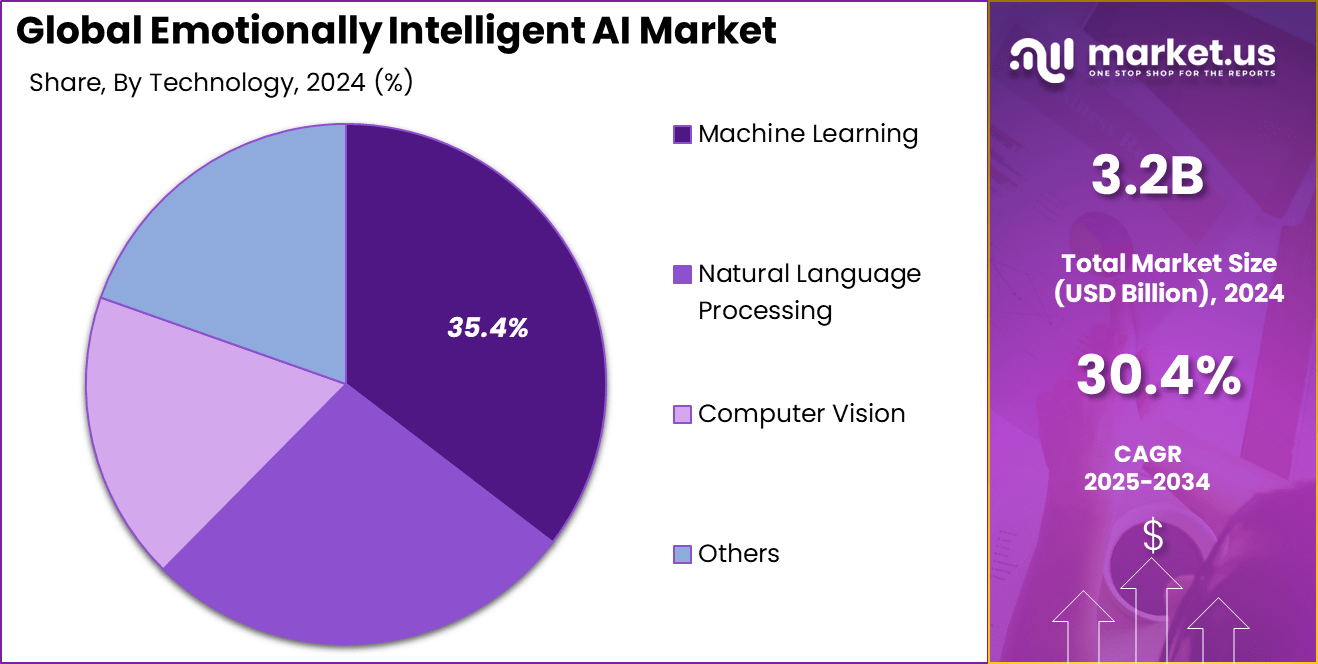Global Emotionally Intelligent AI Market Size, Share Analysis Report By Offering (Solutions (Emotion Recognition, Emotion AI SDKs & APIs, Emotion Analytics, Others), Services (Professional Services, Managed Services)), By Type (Text Focused, Voice Focused, Video & Multi Modal), By Technology (Machine Learning, Natural Language Processing, Computer Vision, Others), By Application (Customer Experience Management, Marketing, Sales, and Advertising, Personal Assistants & Virtual Agents, Mental Health & Well-Being Monitoring, Driver Safety & Monitoring, Human Resources & Recruitment, Others), By Industry (Retail & e-Commerce, IT & Telecom, Healthcare, Automotive, Media & Entertainment, Travel & Hospitality, Others), Region and Companies – Industry Segment Outlook, Market Assessment, Competition Scenario, Trends and Forecast 2025-2034
- Published date: April 2025
- Report ID: 145559
- Number of Pages: 311
- Format:
-
keyboard_arrow_up
Quick Navigation
Report Overview
The Global Emotionally Intelligent AI Market size is expected to be worth around USD 45.5 Billion By 2034, from USD 3.2 billion in 2024, growing at a CAGR of 30.4% during the forecast period from 2025 to 2034. In 2024, North America held a dominant market position, capturing more than a 34.2% share, holding USD 1.09 Billion revenue.
Emotionally intelligent AI, often referred to as emotion AI or affective computing, represents a subset of artificial intelligence designed to measure, understand, simulate, and react to human emotions. This type of AI aims to replicate the emotional intelligence traditionally associated with humans, which includes the ability to perceive, interpret, and respond to both one’s own emotions and those of others.
The market for emotionally intelligent AI is driven by several key factors that enhance its demand across various industries. These include its potential to revolutionize human-computer interaction by providing more intuitive and empathetic user experiences in sectors such as customer service, healthcare, and education.

The ability of these AI systems to understand and respond to human emotions in real-time significantly boosts customer satisfaction and engagement, which is crucial for businesses in today’s digital age. One of the primary drivers of the emotionally intelligent AI market is the increasing need for enhanced customer service and user experience.
Businesses are investing in emotion AI technologies to better understand customer behaviors and preferences, which can lead to more effective marketing strategies and improved customer retention rates. Moreover, the growing emphasis on mental health and well-being has spurred the use of emotionally intelligent AI in applications that offer support and monitoring for individuals experiencing emotional and psychological challenges.
According to the research conducted by electroiq, emotional intelligence (EQ) ranks as one of the top 10 skills valued in the workplace through at least 2025. Individuals possessing high EQ levels reportedly earn approximately $29,000 more annually than their less emotionally skilled peers. The effectiveness of leaders appears significantly linked to emotional intelligence, accounting for 67% of their success.
Furthermore, companies that emphasize the recruitment and development of emotionally intelligent employees see a notable increase in revenue, with a reported growth of 22%. The impact of emotional intelligence extends broadly across career success metrics, with Emotional Intelligence Statistics revealing that 90% of top performers are distinguished by high EQ levels.
Emotional intelligence is credited with influencing 58% of performance across various jobs, surpassing IQ as a predictor of career success. Additionally, employees with robust emotional intelligence are found to perform 127% better than those with lower EQ levels. Currently, 42% of global companies invest in emotional intelligence training for senior managers.
The emotionally intelligent AI market is characterized by several emerging trends, including the integration of AI in mental health applications and the automotive industry, where it enhances safety and user experience. There is also a notable trend toward the use of emotion AI in educational tools, which adapt to the emotional state of students to provide customized learning experiences.
Key Takeaways
- The global Emotionally Intelligent AI market is poised for robust growth over the next decade, with the market size projected to expand from USD 3.2 billion in 2024 to approximately USD 45.5 billion by 2034. This growth reflects a strong CAGR of 30.4%
- In 2024, North America captured more than 34.2% of the global market share, generating approximately USD 1.09 billion in revenue.
- Within the region, the United States alone contributed around USD 0.87 billion, accounting for the majority of the revenue. The market in the U.S. is forecasted to grow at a CAGR of 28.4%, reaching USD 10.6 billion by 2034.
- Under the “By Offering” segment, solutions account for 68.6% of the global revenue. This trend highlights the market’s strong inclination toward ready-to-deploy platforms and frameworks designed to interpret human emotions across digital interfaces.
- Among the different types of emotionally intelligent AI systems, text-focused AI leads with 37.5% share.
- Machine learning contributes 35.4% to the market by technology. As the foundational engine behind emotionally intelligent AI, machine learning enables systems to detect, interpret, and respond to subtle human emotions, leading to better personalization and engagement.
- The application of emotionally intelligent AI in customer experience management commands a 28.8% share, marking it as the leading use case. Enterprises across industries are leveraging AI to enhance user satisfaction by identifying emotional cues and tailoring responses accordingly.
- The retail and e-commerce sector holds a 25.5% market share, driven by the need to offer personalized and empathetic customer support. Emotionally intelligent AI tools are being used to track customer sentiment, predict buying behavior, and build deeper brand loyalty.
Analysts’ Viewpoint
Investing in emotionally intelligent AI offers substantial opportunities for businesses to innovate and differentiate their product offerings. Companies that incorporate emotion AI into their operations can expect not only to enhance user engagement but also to gain deeper insights into consumer behavior.
Technological advancements in machine learning, deep learning, and computer vision have significantly propelled the capabilities of emotionally intelligent AI. These technologies allow for more accurate and real-time processing of emotional data, thus expanding the potential applications of emotion AI.
However, the regulatory environment continues to evolve as concerns about privacy and ethical implications of emotion data usage remain at the forefront. It is crucial for stakeholders to navigate these regulations carefully to harness the full potential of emotionally intelligent AI while ensuring compliance and protecting user privacy.
The expansion of the emotionally intelligent AI market is influenced by various factors, including technological progress, regulatory landscapes, and shifting consumer expectations. Additionally, the increasing awareness of the benefits of emotion AI in enhancing interpersonal communications and decision-making processes also plays a critical role in driving the adoption of these technologies.
US Market Growth
The US Emotionally Intelligent AI Market is valued at approximately USD 0.87 Billion in 2024 and is predicted to increase from USD 1.12 Billion in 2025 to approximately USD 10.6 Billion by 2034, projected at a CAGR of 28.4% from 2025 to 2034. The leadership of the United States in the emotionally intelligent AI market can be attributed to several key factors that position it uniquely within the global landscape.
Firstly, the innovation landscape in the U.S. is significantly driven by a robust ecosystem of AI startups and established companies focusing on advancing emotionally intelligent AI. For example, companies like Hume AI and Behavioral Signals are pioneering technologies that enhance human-AI interactions by improving the emotional intelligence of AI systems.
Secondly, the regulatory and ethical frameworks in the U.S. provide a conducive environment for the growth and implementation of AI technologies. Despite the challenges such as privacy risks and the potential for bias, there is a growing discourse on creating ethical AI, which ensures that AI technologies are developed and deployed responsibly.

In 2024, North America held a dominant market position, capturing more than a 34.2% share, with revenues amounting to USD 1.09 Billion. The leadership of North America in the emotionally intelligent AI market is driven by several pivotal factors.
Firstly, North America benefits from a high concentration of technological innovation and a strong presence of key industry players. The region is home to a thriving tech sector, characterized by substantial investments in research and development and a supportive ecosystem that fosters innovation in AI technologies.
Secondly, the U.S. and Canada have robust infrastructural capabilities that support the deployment and scaling of AI technologies. With high internet penetration rates and widespread adoption of digital technologies across commercial and private sectors, North America provides a fertile ground for the integration of emotionally intelligent AI into everyday applications.

Offering Analysis
In 2024, the Solutions segment held a dominant market position within the emotionally intelligent AI market, capturing more than a 68.6% share. This substantial market share can be attributed to the increasing integration of emotion recognition technologies across various customer-service oriented industries.
Solutions such as emotion recognition software, emotion AI SDKs & APIs, and emotion analytics are pivotal in enhancing consumer interaction and experience. These technologies enable businesses to analyze emotional data in real time, leading to more personalized services and improved customer satisfaction.
The demand for emotion recognition solutions is primarily driven by their applications in sectors such as retail, healthcare, and automotive, where understanding consumer emotions plays a critical role in tailoring marketing strategies and product offerings. For instance, in retail, emotion recognition software can analyze customer expressions in real-time to adjust digital signage content or promotions, thereby increasing sales and customer engagement.
Additionally, the proliferation of Emotion AI SDKs & APIs allows developers to seamlessly integrate emotion recognition capabilities into existing applications, expanding the reach and applicability of emotionally intelligent solutions. These tools are instrumental for organizations looking to incorporate advanced emotional intelligence features without the need to develop these complex systems from scratch.
Type Analysis
In 2024, the Text Focused segment held a dominant market position within the emotionally intelligent AI market, capturing more than a 37.5% share. This leadership is primarily due to the extensive application of text-based emotional AI in customer service, social media monitoring, and content management.
Text Focused emotional AI tools analyze written communication to detect sentiments and emotional cues, enabling businesses to understand and respond to customer feedback more effectively. The importance of text analysis in digital communication cannot be overstated, as it provides immediate insights into customer sentiments across various platforms, including emails, chatbots, and social media posts.
Businesses leveraging these technologies benefit from improved customer engagement strategies and enhanced ability to address customer needs proactively. For instance, in customer service, AI-driven text analysis helps in routing customer queries based on emotional tone, ensuring that customers with urgent or negative feedback receive priority attention.
Moreover, the expansion of digital marketing strategies and the need for real-time content optimization are fueling the growth of the Text Focused segment. Emotional AI enables marketers to tailor content based on the emotional response of audiences, making marketing campaigns more effective and increasing return on investment.
Technology Analysis
In 2024, the Machine Learning segment held a dominant market position within the emotionally intelligent AI market, capturing more than a 35.4% share. This prominence is driven by the fundamental role that machine learning (ML) technologies play in enhancing and automating emotional intelligence solutions.
Machine learning algorithms are at the core of most AI systems, enabling them to analyze large datasets efficiently and learn from them, which is crucial for accurately recognizing and processing human emotions. Machine learning’s capability to interpret complex data without explicit programming allows for more nuanced understanding and prediction of emotional states.
This is particularly advantageous in applications such as customer interaction management, personalized content delivery, and behavior prediction, where understanding subtle emotional cues can significantly enhance the effectiveness of the service provided. The versatility of machine learning also fosters innovation in other segments of emotionally intelligent AI, such as voice and visual emotion recognition.
Here, ML algorithms help decipher the emotional content from vocal intonations and facial expressions, respectively, broadening the scope of where emotionally intelligent solutions can be applied. From security and surveillance systems to interactive learning environments, the integration of machine learning is proving to be indispensable.

Application Analysis
In 2024, the Customer Experience Management segment held a dominant market position within the emotionally intelligent AI market, capturing more than a 28.8% share. This leadership is primarily attributable to the growing emphasis on enhancing customer satisfaction and building lasting relationships in competitive markets.
Emotionally intelligent AI technologies are key to understanding and responding to the emotional needs of customers in real time, which directly impacts customer loyalty and business growth. The application of emotionally intelligent AI in customer experience management enables businesses to automate and personalize customer interactions at scale.
For instance, AI-driven chatbots and virtual agents equipped with emotion recognition capabilities can adapt their responses based on the emotional tone of customer inquiries, thereby offering a more empathetic and contextually appropriate customer service. This level of personalized engagement helps businesses meet the increasing expectations of their customers, who often seek quick, empathetic, and efficient interactions.
Furthermore, the integration of emotional AI in customer feedback analysis transforms vast amounts of unstructured data – such as comments, reviews, and open-ended survey responses—into actionable insights. This capability allows companies to swiftly identify and address areas of concern, thereby preventing potential dissatisfaction and enhancing the overall customer experience.
Industry Analysis
In 2024, the Retail & e-Commerce segment held a dominant market position within the emotionally intelligent AI market, capturing more than a 25.5% share. This leading position is largely driven by the critical need for enhancing customer interactions and personalizing shopping experiences in an increasingly digital marketplace.
Emotionally intelligent AI tools in this sector are pivotal in analyzing and responding to consumer behavior and emotional responses, thereby driving sales and improving customer loyalty. Retailers and e-commerce platforms are leveraging these AI technologies to create dynamic and responsive shopping environments.
For instance, AI-powered systems can analyze customer expressions via video feeds in physical stores or monitor digital interactions to gauge satisfaction and tailor marketing strategies. This capability allows retailers to offer personalized recommendations and promotions in real-time, enhancing the shopping experience and increasing the likelihood of purchases.
Moreover, emotionally intelligent AI facilitates a deeper understanding of customer reviews and feedback on e-commerce platforms. By employing natural language processing and sentiment analysis, these platforms can swiftly identify and categorize customer emotions and sentiments, helping brands to quickly address any issues and adapt their products or services accordingly.
Key Market Segments
By Offering
- Solutions
- Emotion Recognition
- Emotion AI SDKS & APIS
- Emotion Analytics
- Others
- Services
- Professional Services
- Managed Services
By Type
- Text Focused
- Voice Focused
- Video & Multi Modal
By Technology
- Machine Learning
- Natural Language Processing
- Computer Vision
- Others
By Application
- Customer Experience Management
- Marketing, Sales, and Advertising
- Personal Assistants & Virtual Agents
- Mental Health & Well-Being Monitoring
- Driver Safety & Monitoring Human Resources & Recruitment
- Others
By Industry
- Retail & e-Commerce
- IT & Telecom
- Healthcare
- Automotive
- Media & Entertainment
- Travel & Hospitality
- Others
Key Regions and Countries
- North America
- US
- Canada
- Europe
- Germany
- France
- The UK
- Spain
- Italy
- Rest of Europe
- Asia Pacific
- China
- Japan
- South Korea
- India
- Australia
- Singapore
- Rest of Asia Pacific
- Latin America
- Brazil
- Mexico
- Rest of Latin America
- Middle East & Africa
- South Africa
- Saudi Arabia
- UAE
- Rest of MEA
Driver
Enhanced Focus on Mental Health and Well-Being
The demand for emotional intelligence (EI) tools is notably driven by an increased emphasis on mental health and well-being in both personal and professional spheres. As awareness of mental health issues rises, organizations are incorporating emotional well-being into their workplace culture.
Emotional intelligence is crucial in managing stress, reducing anxiety, and boosting overall mental health, especially in high-stress environments. The integration of EI programs into broader wellness initiatives by companies supports employees’ mental health and fosters a balanced, productive workplace.
Restraint
High Costs and Resource Intensity
A significant restraint in the emotional intelligence market is the high costs and resource demands associated with implementing effective EI training programs. Smaller organizations, in particular, find it challenging to justify the investments required for comprehensive EI development tools.
The financial and logistical burdens involved in providing personalized training, assessments, and integrating AI-based solutions deter widespread adoption, especially in economically constrained regions, thereby slowing the market’s overall growth.
Opportunity
AI and ML Integration in EI Tools
The integration of Artificial Intelligence (AI) and Machine Learning (ML) in EI tools presents a substantial opportunity for market expansion. AI-powered systems are increasingly used to enhance learning experiences by providing personalized training and real-time feedback.
These technologies can analyze facial expressions, speech patterns, and physiological responses to assess emotional states, aiding individuals and organizations in understanding and improving emotional dynamics and interpersonal skills.
Challenge
Lack of Standardization and Metrics
A critical challenge in the emotional intelligence market is the absence of standardization and clear measurement metrics for EI training and assessments. Emotional intelligence is inherently subjective and difficult to quantify, leading to varied training and assessment methodologies.
Without universally accepted standards, it is challenging for organizations to assess the effectiveness of EI programs and ensure consistent outcomes. This lack of clarity hampers widespread adoption and limits the scalability of EI solutions, particularly in organizations that prioritize proven, data-driven approaches for employee development.
Growth Factors
The Emotionally Intelligent AI market is experiencing robust growth, propelled by several key factors. Firstly, the increasing demand for enhancing customer experiences across various industries plays a pivotal role. Emotion AI technologies enable businesses to deliver more personalized and empathetic customer service by analyzing and responding to customer emotions in real time.
This capability is becoming essential in sectors like retail, healthcare, and customer support, where understanding and reacting to consumer emotions can significantly enhance customer satisfaction and loyalty. Furthermore, advancements in AI and machine learning technologies are accelerating the development and deployment of emotion AI systems.
These technologies provide the backbone for more sophisticated emotion recognition capabilities that can interpret facial expressions, voice intonation, and physiological signals, thereby enabling more nuanced interactions.
Another significant growth driver is the broad application potential of emotion AI across different sectors, including healthcare and education. In healthcare, emotion AI is used to improve patient interactions by assessing emotional states, which can be critical in settings like mental health evaluations. In education, emotion AI helps create more responsive and engaging learning environments by adapting to the emotional cues of students.
Emerging Trends
Emerging trends in the emotionally intelligent AI market focus on enhancing interactivity and personalization. One of the notable trends is the integration of emotion AI into conversational agents and customer service bots, enabling these systems to offer more empathetic and context-aware responses. This trend is driven by the growing sophistication of natural language processing technologies that allow more accurate interpretation of emotional content in text and speech.
Multimodal emotion detection is another trend gaining traction, which combines data from various sources – facial expressions, voice nuances, and even physiological responses – to provide a more comprehensive understanding of an individual’s emotional state. This approach is particularly useful in complex interaction scenarios such as remote learning or telehealth services, where subtle emotional cues need to be assessed accurately.
Additionally, the use of emotion AI in content personalization and marketing strategies is expanding. By understanding and reacting to consumer emotions, businesses can tailor their marketing messages and product recommendations more effectively, thereby increasing engagement and improving conversion rates.
Business Benefits
Emotionally Intelligent AI offers a range of business benefits that contribute to its rapid adoption across industries. Primarily, it enhances customer interaction quality by providing insights into customer emotions, which can help businesses tailor their services and responses to improve customer satisfaction and loyalty. This capability is crucial in competitive sectors where customer experience is a key differentiator.
In the workplace, emotion AI can also play a transformative role by monitoring employee well-being and engagement, thus helping organizations to foster a more supportive and productive work environment. For instance, emotion AI can be utilized to personalize training programs and monitor stress levels, offering interventions when necessary.
Moreover, emotionally intelligent AI drives innovation in product development by offering valuable insights into consumer reactions and preferences. This information can be leveraged to refine product designs and marketing strategies, ensuring that they resonate well with the target audience.
Key Player Analysis
The emotionally intelligent AI market is growing quickly, and some companies are leading the way with real innovation and bold decisions. These key players are not only focused on building smart technology but also on making it more human-centered – able to sense and respond to emotions in meaningful ways.
IBM has taken a strong step forward in the emotionally intelligent AI space through its strategic acquisition of Hakkoda Inc. in April 2025. This move was not just about growth – it reflects IBM’s commitment to expanding its data and AI consulting capabilities.
Microsoft has made notable progress with its emotionally intelligent AI through product innovation. In April 2025, the company introduced major updates to its Copilot assistant. These changes allow Copilot to remember user preferences and complete complex tasks on its own, such as scheduling and research.
NuraLogix is shaping the future of emotionally intelligent AI by blending emotion recognition with health technology. In March 2025, it launched the Anura® MagicMirror™, a smart device that reads facial signals to monitor wellness.
Top Key Players in the Market
- Emotibot
- IBM Corporation
- Microsoft Corporation
- NVISO
- Apple, Inc.
- NuraLogix Corporation
- Cipia Vision Ltd.
- Cogito Corporation
- Realeyes
- Affectiva
- Others
Recent Developments
- In March 2025, NuraLogix unveiled its next-generation Anura® MagicMirror™, a smart mirror integrating AI-powered health monitoring with 4G connectivity. This device is designed to enhance applications in telehealth, retail, and wellness sectors.
- In January 2024, NVISO collaborated with BrainChip Holdings Ltd. to demonstrate AI-enabled human behavioral analysis at CES 2024. This partnership showcased advanced AI capabilities for analyzing human behavior in consumer products.
Report Scope
Report Features Description Market Value (2024) USD 3.2 Bn Forecast Revenue (2034) USD 45.5 Bn CAGR (2025-2034) 30.4% Base Year for Estimation 2024 Historic Period 2020-2023 Forecast Period 2025-2034 Report Coverage Revenue forecast, AI impact on market trends, Share Insights, Company ranking, competitive landscape, Recent Developments, Market Dynamics and Emerging Trends Segments Covered By Offering (Solutions (Emotion Recognition, Emotion AI SDKs & APIs, Emotion Analytics, Others), Services (Professional Services, Managed Services), By Type (Text Focused, Voice Focused, Video & Multi Modal), By Technology (Machine Learning, Natural Language Processing, Computer Vision, Others), By Application (Customer Experience Management, Marketing, Sales, and Advertising, Personal Assistants & Virtual Agents, Mental Health & Well-Being Monitoring, Driver Safety & Monitoring, Human Resources & Recruitment, Others), By Industry (Retail & e-Commerce, IT & Telecom, Healthcare, Automotive, Media & Entertainment, Travel & Hospitality, Others) Regional Analysis North America – US, Canada; Europe – Germany, France, The UK, Spain, Italy, Russia, Netherlands, Rest of Europe; Asia Pacific – China, Japan, South Korea, India, New Zealand, Singapore, Thailand, Vietnam, Rest of APAC; Latin America – Brazil, Mexico, Rest of Latin America; Middle East & Africa – South Africa, Saudi Arabia, UAE, Rest of MEA Competitive Landscape Emotibot, IBM Corporation, Microsoft Corporation, NVISO, Apple, Inc., NuraLogix Corporation, Cipia Vision Ltd., Cogito Corporation, Realeyes, Affectiva, Others Customization Scope Customization for segments, region/country-level will be provided. Moreover, additional customization can be done based on the requirements. Purchase Options We have three license to opt for: Single User License, Multi-User License (Up to 5 Users), Corporate Use License (Unlimited User and Printable PDF)  Emotionally Intelligent AI MarketPublished date: April 2025add_shopping_cartBuy Now get_appDownload Sample
Emotionally Intelligent AI MarketPublished date: April 2025add_shopping_cartBuy Now get_appDownload Sample -
-
- Emotibot
- IBM Corporation
- Microsoft Corporation
- NVISO
- Apple, Inc.
- NuraLogix Corporation
- Cipia Vision Ltd.
- Cogito Corporation
- Realeyes
- Affectiva
- Others












